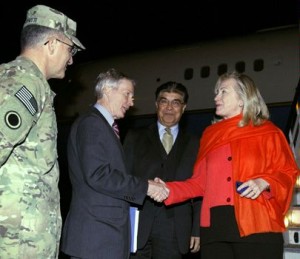Border Post Attack Fallout Continues: No Obama Apology; Pakistan Threatens WOT Role
[youtube]http://www.youtube.com/watch?v=-BSoEeLgnm0[/youtube]
Pakistan and the US continue to provide widely differing accounts of the NATO attack on two border posts just inside the Pakistan border that killed 24 Pakistani troops early Saturday morning. Although both sides have adjusted their stories somewhat in the intervening time, the US still claims that NATO forces were under fire from across the border and Pakistan insists the attack was unprovoked.
Pakistan’s Inter Services Public Relations released a video of the aftermath of the attack. More description of the video is provided by Dawn, but the presence of the large, established buildings at the peak of the mountain ridge fits with this description quoted in my post from Wednesday:
“This was a visible, well-made post, on top of ridges, made of concrete. Militants don’t operate from mountaintops, from concrete structures.”
Meanwhile, as MadDog pointed out, the New York Times reports that the Obama administration has decided not to have the President issue a formal apology:
On Monday, Cameron Munter, the United States ambassador to Pakistan, told a group of White House officials that a formal video statement from Mr. Obama was needed to help prevent the rapidly deteriorating relations between Islamabad and Washington from cratering, administration officials said. The ambassador, speaking by videoconference from Islamabad, said that anger in Pakistan had reached a fever pitch, and that the United States needed to move to defuse it as quickly as possible, the officials recounted.
Defense Department officials balked. While they did not deny some American culpability in the episode, they said expressions of remorse offered by senior department officials and Secretary of State Hillary Rodham Clinton were enough, at least until the completion of a United States military investigation establishing what went wrong. Read more →

